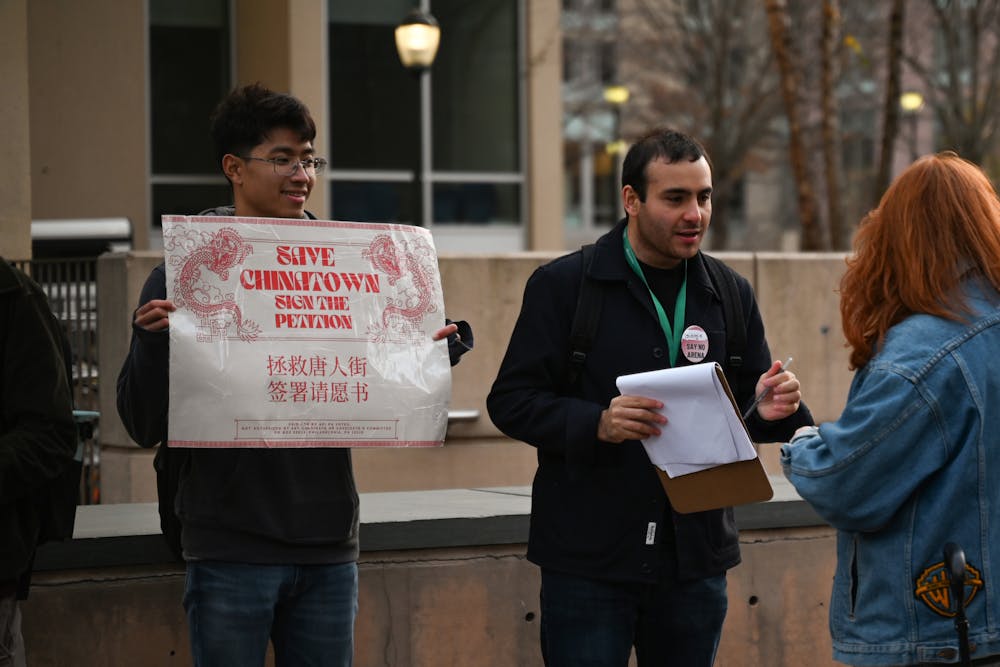
A panel of Penn community members and local activists discussed preservation efforts and the threats to Philadelphia's Chinatown on April 2.
The panel featured professor of city and regional planning Domenic Vitiello, activist and founding member of Asian Americans United Debbie Wei, and co-founder of Students for the Preservation of Chinatown and College junior Kenny Chiu. The conversation, titled "Preserving Chinatowns in Philadelphia and Beyond," was moderated by Weitzman School of Design lecturer Kecia Fong and drew an audience of around 100 people.
The panelists criticized the proposal, first announced in July 2022, to construct a Philadelphia 76ers arena at the 1000 blocks of Market and Filbert streets, adjacent to Philadelphia’s Chinatown. They emphasized the importance of protecting communities from gentrification and redevelopment, both locally and across the nation.
Wei is the co-founder of Asian Americans United, a Philadelphia-based organization that advocates for youth leadership, education, immigrant rights, and cultural preservation. At the panel, she expressed concerns that the proposed construction would displace local inhabitants and damage a diverse community.
“To me, Chinatown is a container of community,” Wei said. “The streets contain history, memories and — most importantly — relationships.”
Wei said that the Asian American community in Philadelphia has been marginalized for decades and that city planners are not paying enough attention to the community’s concerns.
“This community and relationships are not a commodity,” Wei said. “It is intangible, and hence it is worthless in Western economics, as you can’t buy or sell its members.”
She added that Chinatown is home to schools, religious centers, and subsidized apartments that provide affordable housing to Asian American residents. She criticized the equity investors who are financing the construction project as "taking human lives as a commodity," listing the three developers who formed the 76DevCo organization specifically to build the arena. The group consists of Campus Apartments CEO David Adelman and Philadelphia 76ers co-owners Josh Harris and David Blitzer.
Chiu has also opposed the arena construction, founding SPOC in an effort to help save the neighborhood in which he grew up. He said that his first experience with gentrification occurred a few years ago, when the affordable housing complexes of his childhood were set to be converted into federal prisons. Within the last two years, he has concentrated his efforts to combat the building of the stadium in his old neighborhood.
“I feel the need to pay homage to the previous generations who fought to keep Chinatown alive for me to grow up in,” Chiu said.
Currently, he is working with SPOC to open a youth center in Chinatown, which is intended to be a safe space for local children to learn about advocacy, engage in art, and receive free mentoring from college students.
Chiu said that considering Penn’s history of gentrification, the University could partially rectify their legacy by fighting the development of the arena. However, he said that the institution is unlikely to take a stand against the stadium's construction, citing the Penn Medicine logo displayed on the 76ers jersey and the Penn Board of Trustees' close connection with the team.
Chiu said that conversations such as the panel play an instrumental role in raising awareness about the issue, noting the activist work of Penn professors including Vitiello.
“Chinatowns only survive today because people who live there push it back,” Vitiello said. “For the last 125 years, governments and private projects have been targeting Chinatowns for either complete or partial destruction.”
He mentioned a New York Times article from 1913, which stated that a chief benefit to the expansion of the New York City Civic Center “would be the removal of Chinatown.”
“It was acceptable and desirable to be openly racist,” Vitiello said.
The audience included both undergraduates and graduate students. Nour Jafar, a third-year historic preservation graduate student, said that she attended the event because she had ethical objections to the stadium’s construction.
“They’re going to be here for only a season,” she said. “But they are going to displace an entire district, and the idea of an economic boost is nonexistent.”
Franny Hutchins, a student in the same program, said she attended the event due to her background of conservation and preservation. She found the plan to build the stadium disturbing to future generations of families who wish to settle in Chinatown.
“It’s not just about the past and the present, but about preserving our rights to the future,” Fong said.
The Daily Pennsylvanian is an independent, student-run newspaper. Please consider making a donation to support the coverage that shapes the University. Your generosity ensures a future of strong journalism at Penn.
Donate







